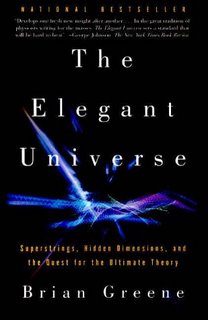My career as a scientist was even shorter (meaning I never had one). Much to my parents' chagrin, I was always a dunce when it came to science. Newton's Laws of Motion were foreign concepts to me as well as the organization of the Periodic Table of Elements (halogen what?). Good Chinese children excel at biology and physics and grow up to become doctors and engineers. My father received his masters degree in chemical engineering at the University of Virginia, but for some reason my dad's genetic affinity towards math and science was never passed down to me or my siblings. (Sorry Mom and Dad, but you'll have to look to your grandkids to receive the Tung family's first M.D.)
As much as math and science perplex and boggle my mind, I find them to be fascinating subjects. Especially theoretical physics, which attempts to explain the inner-workings of the universe on both macro and micro levels. Multiple dimensions, parallel universes, warp theory---oh my!
 I'm currently reading Brian Greene's The Elegant Universe, which explains superstring theory (as well as quantum mechanics, special relativity, and general relativity) in layman's terms. The book truly is an exercise of my mind because these theories are so complex, even when they are dumbed down for dunces like me. Our universe is a strange place, my friends, and the laws that govern it on a macro level differ from the laws that govern it on a micro level. Weird. And not only are there four dimensions in space, there possibly may be a fifth, a sixth, and even more. Weirder.
I'm currently reading Brian Greene's The Elegant Universe, which explains superstring theory (as well as quantum mechanics, special relativity, and general relativity) in layman's terms. The book truly is an exercise of my mind because these theories are so complex, even when they are dumbed down for dunces like me. Our universe is a strange place, my friends, and the laws that govern it on a macro level differ from the laws that govern it on a micro level. Weird. And not only are there four dimensions in space, there possibly may be a fifth, a sixth, and even more. Weirder. Reading The Elegant Universe has made me greatly appreciate the lives and works of Isaac Newton and Albert Einstein. In many ways, Newton and Einstein are the "prophets" of science. They shattered previous methods of thinking and replaced them with their own radical ideologies. They are the "enlightened ones" who provided answers to centuries-old dilemmas. Their ideas have affected technology, engineering, and astronomy as well as culture and philosophy.
Of course, there are hundreds of scientists and mathematicians who have influenced the work of Newton and Einstein and these people cannot be ignored. Indeed, Newton and Einstein could not have rocked the world of physics without the discoveries of their predecessors. Every contribution, every discovery allowed for Newton and Einstein to change the world. But men like Sir Newton and Mr. Einstein only come around every few hundred years. Much like Jesus Christ, Mohammed, or Guru Nanak.
An interesting idea has been brewing in my head... In the scriptures we read that humans learn "line by line, precept by precept," meaning we learn a little bit at a time. We can't learn all the lessons we have to learn in a month or in a year. Instead, we learn a little here and we learn a little there, continually building up our well of knowledge and experience.
Thus it makes sense that the realm of science is dictated by this "line by line" methodology as well. Over six-thousand years ago when human civilization first emerged, our ancestors had only a rudimentary understanding of the world around them. Slowly, mathematics and the sciences developed. We grew to understand astronomy, biology, geology, chemistry, and physics. We mapped the constellations, developed measurements, discovered new species, and even harnessed nuclear energy. Our world today is a product of nearly 10,000 years of learning. And what's wonderful is that we will continue to better understand our world and our universe as time continues on---line by line, precept by precept.
OK. So if human understanding and science run on this line-by-line precept, then what about religion? What if, like physics, we are gaining a little knowledge here and a little knowledge there about the nature of god and the extent of his creations?
If this theory is correct, then religion cannot be static. It must be fluid---it must be willing to change and it must be willing to learn. When the human race was in its infancy, god revealed a small portion of his nature and his will to our ancestors. And now after centuries of progression, god continues to slowly teach us about his plan for mankind. Thus, to learn about god, we must learn about all faiths. If he has revealed a part of himself to the Jews and a part of himself to the Sikhs and a part of himself to the Zoroastrians, then we must look for him in these religions.And if God indeed knows all things, then we must search for him beyond religion alone. We must study philosophy, art, science, history, literature, linguistics, mathematics---in short, everything. In D&C 93:53, God commands us to: "obtain a knowledge of history, and of countries, and of kingdoms, of laws of God and man, and all this for the salvation of Zion." The last portion of this verse is so interesting: all this for the salvation of Zion. In essence, we cannot progress if we refuse to learn. For learning is of God; and to learn is to be of Him.
God is far less mysterious then we are inclined to believe. (At least in my mind anyway.) If he loves us and is concerned about us, then surely we can find him. And with the wealth of religions and philosophies in this world, I know he is not very far.
